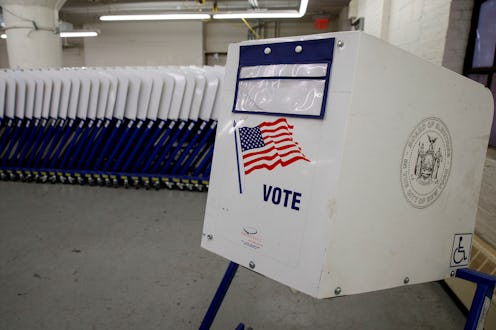News
Maine Splits Up Its Electoral Votes By District
If you already have trouble understanding the Electoral College, then learning this will not make your life easier. The Electoral College takes a lot of criticism for being a confusing and imperfect election system. Maine and Nebraska even go a step further, using a different method to award their electoral votes than the rest of the country. So why isn't Maine a winner-take-all state?
All but two of the states award their electoral votes in a "winner-take-all" method, meaning whichever candidate wins the larger popular vote in the state gets all of that state's electoral votes. The only two holdouts are Maine and Nebraska. These states designate their electoral votes by congressional district. The number of electoral votes a state gets depends on the amount of seats it has in congress. Each congressional district gets a vote, which in total equals the number of representatives the state has in the House. The statewide winner also gets two votes, which come from the two Senate seats the state holds.
While this seems like a more equitable way to delegate electoral votes to candidates, it actual can result in the same anomalies that the Electoral College system as a whole is criticized for.
In 2012, Mitt Romney lost the popular vote handily, but actually won 15 more congressional districts than President Barack Obama. So under the congressional district system, that would create a situation where the person who lost the popular vote won the presidency, which is the biggest complaint people have about the Electoral College.
Some feel that a national popular vote is the answer to our electoral woes. Fair Vote is a nonpartisan election reform advocacy group that is working to make a national popular vote the way we choose our president. Fair Vote Executive Director Rob Richie tells Bustle that this method, the same system used to determine gubernatorial, congressional and local political elections, is simple and most reflective of the will of the people.
Richie said that most of the country feels forgotten during the presidential election, and that is a problem not only for voter turnout, but for general political engagement. Nominees spend a substantially larger amount of resources and time in battleground states, and the other 34 or more states in the nation are largely unvisited during the general election season, he said.
If the country adopted a national popular vote, then candidates would be more inclined to seek every person's vote, not just the ones who live in Pennsylvania and Ohio. But how would that work? Richie said that Fair Vote is working with state legislatures across the country to create the National Popular Vote Plan. States would sign on to be part of a voting bloc, which it would implement through legislation at the state level. The states who sign on to be a part of the bloc would agree to award their electoral votes to whoever wins the national popular vote.
So far 10 states and D.C. have signed on to the National Popular Vote Plan. Richie said that it can go into effect once enough states sign on that the bloc would control at least 270 electoral votes, the minimum needed to win the presidency. That is far down the line, he said. But he thinks that after this unique election season, people will be more open to exploring alternative election systems.
